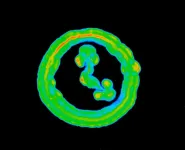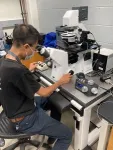(Press-News.org) Bacteria make up more than 10% of all living things but until recently we had little realization that, as in humans, soil bacteria have internal clocks that synchronize their activities with the 24-hour cycles of day and night on Earth.
New research shows just how complex and sophisticated these bacterial circadian clocks are, clearing the way for an exciting new phase of study. This work will provide diverse opportunities, from precision timing of the use of antibiotics, to bioengineering smarter gut and soil microbiomes.
An international collaboration from Ludwig Maximillian University Munich (LMU Munich), The John Innes Centre, The Technical University of Denmark, and Leiden University, made the discovery by probing gene expression as evidence of clock activity in the widespread soil bacterium Bacillus subtilis.
Lead author Dr. Francesca Sartor (LMU Munich) reports: “The circadian clock in this microbe is pervasive: we see it regulating several genes, and a range of different behaviours.”
Professor Antony Dodd from the John Innes Centre added, “It is astonishing that a unicellular organism with such a small genome has a circadian clock with some properties that evoke clocks in more complex organisms.”
Previous work by this collaborative team had demonstrated the existence of a circadian clock in a lab-derived strain of this bacteria. This was the first-time circadian clocks had been observed in the bacterium Bacillus subtilis. Researchers used a technique which inserts an enzyme called luciferase that produces light when a gene is expressed. This bioluminescence guided the team in monitoring the bacterial clock as conditions varied.
The senior author of the publication, Professor Martha Merrow at LMU Munich said: “This study shows that circadian clocks are widely found in Bacillus subtilis. We might capitalize on knowledge of the clock to improve health outcomes and increase sustainability of food production or biotechnology.”
This new study is a significant step forward for multiple reasons. It reveals that these clocks exist in strains collected from natural environments, so could be widespread in this bacteria. Furthermore, B. subtilis continues to show circadian rhythms in both constant dark and constant light, and the researchers reveal examples of nuanced responses found in the circadian clocks of many other organisms. In the field of circadian biology, these responses are known as “aftereffects” and “Aschoff’s Rule.” Taken together, this suggests that, as in more complex organisms, the bacteria can synchronize their physiology and metabolism to different times of the day as light and temperature conditions change.
The discovery offers opportunities for biotechnology, human health, and plant science. Understanding properties of bacterial circadian clocks may help us with industrial applications of microbiology; it could lead to a new understanding of how microbiomes are formed and may indicate how well antibiotics work at certain times of the day to disrupt pathogenic bacteria. The knowledge may also help us in crop protection. Bacillus subtilis is a beneficial soil bacterium used by farmers to assist nutrient exchange, plant development and defense against pathogenic microbes.
The team is developing Bacillus subtilis as a model organism for the study of circadian clocks in bacteria. One of the next steps is to work out which genes are operating to make up the clock mechanism. The team is also curious about how the B. subtilis circadian clock depends on multicellular organization for its full functionality.
Circadian clocks are internal oscillators which offer a selective advantage to organisms by adapting their physiology and metabolism to 24 h changes in the environment, such as the changes in light, temperature or predator behaviour. They give rise to the jarring effects of jet lag, when we pass into different time zones.
Professor Ákos T. Kovács, from Leiden University and Technical University of Denmark said, “The French biologist Jacques Monod once famously said, ‘What is true for E. coli is true for the elephant.’ At the time, he was referring to the universal rules of molecular biology- of DNA and proteins. Similarly, it is amazing that the circadian clock in Bacillus subtilis- a bacterium with just four thousand genes - has a complex circadian system that is reminiscent of circadian clocks in complex organisms such as flies, mammals, and plants".
The circadian clock of the bacterium B. subtilis evokes properties of complex, multicellular circadian systems, appears in Science Advances
END
Astonishing complexity of bacterial circadian clocks
2023-08-04
ELSE PRESS RELEASES FROM THIS DATE:
Does relaxing paywall access help or hurt digital news subscriptions?
2023-08-04
Key Takeaways:
When news sites relax paywall access to their sites, they leverage the power of sampling to increase subscribers.
Temporarily suspending paywall restrictions on certain major stories or trends serves the public interest while conditioning new visitors to pay for access later.
BALTIMORE, MD, August 1, 2023 – A new study has revealed that when news sites temporarily relax or suspend restrictions tied to paywall access, they eventually see an increase in subscribers. This ...
Research reveals the ecological threats of small-scale fisheries in Thailand
2023-08-04
Marine conservation experts have revealed the extent of marine megafauna catch by small-scale fisheries, in Thailand for the first time.
The Newcastle University study provides the first-ever estimate of the annual catch of marine megafauna species, including rays, sharks, sea turtles, dolphins, and dugongs, in Thailand’s small-scale fisheries – those fisheries using small boats, low tech equipment and often haul their fishing gear by hand.
Published in the journal Aquatic Conservation: Marine and Freshwater Research, the results ...
A new, long-term study by researchers at UNC-Chapel Hill finds nitrogen fixation hotspots in Atlantic seaweed
2023-08-04
A new study by researchers at the University of North Carolina at Chapel Hill examined nitrogen fixation among diazotrophs—microorganisms that can convert nitrogen into usable form for other plants and animals—living among sargassum. Sargassum, a brown macroalgae in the seaweed family, floats on the surface of the open ocean and provides habitat for a colorful array of marine life such as small fish, brine shrimp and other microorganisms. Previous studies have overlooked diazotrophs associated ...
New UNC study identifies disparities in testing and treating well water among low-income, BIPOC households in NC
2023-08-04
North Carolina leads the nation for most households relying on private wells as a primary source of drinking water, with one in four households on private wells. These wells are not regulated by the Safe Drinking Water Act, and most are not tested for contaminants, especially in low-income areas.
A new study published in Environmental Justice by researchers at the University of North Carolina at Chapel Hill found that private well testing and treatment levels were significantly predicted by race and income, even though high levels of contamination were equally distributed across the research areas.
“Although we found alarming levels of well water contamination ...
New study shows increase in Welsh breastfeeding rates during pandemic
2023-08-04
A Swansea University-led study revealed breastfeeding rates in Wales increased during the pandemic.
The research, which included all women in Wales who gave birth between 2018 and 2021, found that breastfeeding rates at six months were higher during Covid compared to the pre-pandemic period - with rates increasing from 16.6 per cent before the pandemic to 20.5 per cent in 2020.
The study also found a strong correlation between a mother's intention to breastfeed and the likelihood of exclusively breastfeeding ...
nTIDE July 2023 jobs report: People with disabilities continue to attain employment at an all-time high level
2023-08-04
East Hanover, NJ – August 4, 2023 – People with disabilities maintained their job numbers, reflecting all-time highs in July, according to today’s National Trends in Disability Employment – semi-monthly update (nTIDE), issued by Kessler Foundation and the University of New Hampshire’s Institute on Disability (UNH-IOD). nTIDE experts stated that more people with disabilities are engaged working and seeking work.
Month-to-Month nTIDE Numbers (comparing June 2023 to July 2023)
Based on data from the U.S. Bureau of Labor Statistics (BLS) Jobs Report released today, the labor force participation rate for people with disabilities (ages 16-64) ...
Morris Animal Foundation-funded researchers establish new reptile cell lines
2023-08-04
DENVER/Aug. 4, 2023 – A recent scientific paper published in the journal Microorganisms highlights the development of the first broad range of reptile cell lines, a significant feat that researchers say will help advance reptile conservation.
In the study, which was funded by Morris Animal Foundation and conducted by researchers at the University of Florida College of Veterinary Medicine, researchers established cell lines from a variety of reptiles, including crocodilians, snakes, turtles, tortoises and lizards. Cell lines are populations of cells from multicellular organisms that have been grown in a laboratory and can be used for a ...
Medical student receives the ASH Medical Student Physician-Scientist Award
2023-08-04
Sarah Qureshy, a fourth-year medical student at Weill Cornell Medical College, has been selected by the American Society of Hematology (ASH) as one of four medical students nationwide to receive the 2023-24 ASH Medical Student Physician-Scientist (PhySci) Award.
The ASH PhySci Awards support first-, second- and third-year medical students looking to gain experience in hematology research under the mentorship of an ASH member and to learn more about the specialty. This award, which provides one-year $42,000 grant funding, will enable Qureshy to take a year off from her schooling to carry out an immersive project conducting laboratory, translational ...
Environmental evaluation: ONR part of joint effort to deploy data buoys across Arctic Ocean
2023-08-04
ARLINGTON, Va.—In July 2023, the Office of Naval Research (ONR) partnered with the 144th Airlift Squadron of the Alaska Air National Guard to deploy five different types of weather buoys across more than 1,000 nautical miles of the Arctic Ocean.
Such deployments are critical for maintaining the Arctic Observing Network (AON), which provides observations for weather and ice forecasting and related research.
The buoy air deployment supported the International Arctic Buoy Programme (IABP), a collaborative program comprising more than 32 different research and operational institutions from 10 different countries and four international agencies — including the International Cooperative ...
DOE awards $135 million for groundbreaking research by 93 early career scientists
2023-08-04
WASHINGTON, D.C. — The U.S. Department of Energy (DOE) today announced the selection of 93 early career scientists from across the country who will receive a combined $135 million in funding for research covering a wide range of topics, from artificial intelligence to astrophysics to fusion energy. The 2023 Early Career Research Program awardees represent 47 universities and 12 DOE National Laboratories across the country. These awards are a part of the DOE’s long-standing efforts to develop the next generation of STEM leaders ...




